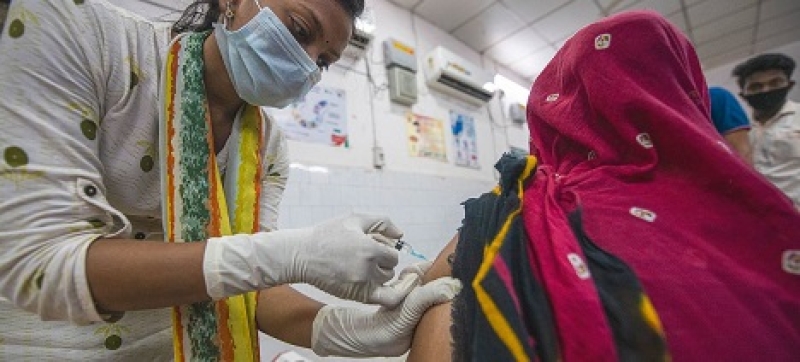- Cold wave disrupts life, livelihoods across northern Bangladesh |
- US to Exit 66 UN and Global Bodies Under New Policy Shift |
- LPG Supply Restored Nationwide After Traders End Strike |
- Stocks advance at both bourses; turnover improves |
- LCs surge for stable dollar, but settlement still sluggish |
CSOs against hollow pandemic treaty of “green cloth with big holes”

COVID-19 vaccines are administered at a hospital in Odisha, India. - UNICEF. Priyanka Parashar
Joint-Statement of 32 CSOs For Resumed Session of 12th Meeting of WHO Intergovt Negotiation Body on a pandemic agreement (INB) held in WHO, Geneva (2 to 6 December 2024)
This is a statement on behalf of 32 CSOs across WHO regions, and with 8 or more participating in this meeting, either online or in person.
As CSOs, we are usually delighted to see more text getting greened—indicating progress towards a meaningful instrument with effective measures to protect public health and avoid past tragedies. However, this time, there is no excitement. Many diplomats tell us this will be a hollow treaty, with the current text resembling a “green cloth with big holes.” We have several critical questions for Member States, and we expect their responses:
Article 4: What’s new or impactful? While some define this article as a priority, they avoid negotiating meaningful measures, opting for vague future processes. Preventing outbreaks like Mpox, and ensuring they do not escalate into PHEICS or pandemics, requires urgent and practical measures, not abstract commitments to future negotiations.
Article 12: Many Members have shown willingness to negotiate substantively PABS throughout the INB process. Yet, they face extreme pressure to defer PABS discussions to a future annex. Why not now, given its centrality to the instrument? If not now, when?
Article 9: What protections does it guarantee to countries during emergencies, apart from exposing their populations to clinical trials with uncertain benefits?
Article 10: How will it strengthen manufacturing and production diversification without commitments to share technology, financing, or removing IP barriers? Are we aiming to limit WHO’s role under IHR 2005 – the only binding instrument on health emergencies?
Article 11: What remains of this article? How does it improve access to technologies? Why is it not asking Parties to improve IP laws on flexibilities for public health? The reluctance to agree to a peace clause in IP laws is detrimental.
Article 13: Why delay finalizing the Global Supply Chain Network’s basic structure and functions, which are not contested elements?
Article 19: Where is the obligation for Parties with resources and capacities to support those with limited capacities? What happened to the promise to reflect the principle of common but differentiated responsibilities without using the phrase?
Article 20: Does it generate a clear obligation to provide funds for sustainable implementation of the instrument, pandemic PPR and core health systems strengthening? Or is it only a call for project funding driven by private actors?
Even in a framework convention, a baseline of legal rights and obligations is essential for the instrument to function. The current draft shows no such baseline. Instead, it protects the interests of pharmaceutical and digital companies, not the people’s rights or globally shared interests.
We had hoped that negotiating a public health instrument for equity at WHO would yield better outcomes than what we witnessed at the WTO during the pandemic.
You still have the opportunity to be on the right side of history. We believe you can create a legally binding pandemic instrument that provides real protection for everyone, regardless of who or where they are. The world needs an instrument you can be proud of, not just a photo opportunity post-COVID-19. The possibility is in your hands.
Endorsements
Civil Society Organisations Country/Region
Accion Internacional para la Salud Perú
Aids Healthcare Foundation (AHF) Global
Association for Proper Internet Governance Switzerland
Association of Women of Southern Europe Regional
Australian Fair Trade and Investment Network Australia
Brazilian Interdisciplinary AIDS Association (ABIA) Brazil
Colectivo Los Pacientes Importan Peru
Disability Peoles Forum Uganda Uganda
Egyptian Initiative for Personal Rights (EIPR) Egypt
Fundación Ifarma Colombia
Geneva Global Health Hub Switzerland
Health Action International Asia Pacific Regional
Indonesia for Global Justice (IGJ) Indonesia
Innovarte ONG Chile
International Treatment Preparedness Coalition (ITPC) Global
Malaysian Food Sovereignty Forum (FKMM) Malaysia
Mouvement Gabonais pour la Promotion de la Bonne Gouvernance Gabon
OXFAM Global
People’s Health Movement Burundi Circle Burundi
Public Health Association of Australia Australia
Public Services International Global
Reacción Climática Bolivia
Sandvik Health Empowerment Foundation Nigeria
Society for international Development Global
Thai Network of People Living with HIV/AIDS (TNP+) Thailand
The Reformed Drug and Substance Abuse Initiative Nigeria
Third World Network Global
Wemos Netherlands
Women, Law and Development, (MULEIDE) Mozambique
Working Group on Intellectual Property Brazil
Yolse, Santé Publique et Innovation Regional
Actual Delivery of the statement during the session has been adjusted for meeting time requirements. At the time of delivery, only 26 Organisations had recorded their support. While another 6 organisations endorsed the statement afterwards. – Third World Network

